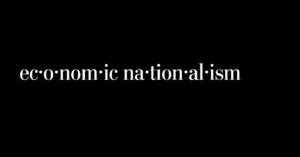Sociolinguistics & Power & 1930’s
March 9, 2017Washington Post
March 9, 2017
[45] and his chief strategist, Stephen K. Bannon, have introduced a new political language to Washington — a populist and nationalist rhetoric that cuts across traditional Republican vs. Democratic divisions.
Some of the words and phrases the administration has injected into Washington’s political vocabulary previously thrived on the far reaches of both left and right.
“…economic nationalism,” which Bannon defined as a singular focus on American jobs. The idea, according to two senior administration officials, is to pull back from multilateral trade agreements, multinational organizations, and the free flow of goods (and, to some degree, workers) that the previous four presidents emphasized. This was the “new world order” that President George H.W. Bush envisioned after the fall of the Berlin Wall in 1989 — a system of interlocking, international agreements and alliances that he hoped would replace the Cold War faceoff between communism and capitalism.
Insert: New retired US Ambassador Daniel Fried on MSNBC with Rachel Maddow: “West (Western countries) at lowest we’ve seen since the 1930’s”
That system, Bannon and Miller believe, has failed. Bannon wants to replace it wholesale — a blizzard of change “as exciting as the 1930s, greater than the Reagan revolution,” he said — with a system that used to be known as “protectionism,” using tariffs and other government action to press U.S. companies to bring offshored jobs back home and make their goods here. Most economists dismiss the idea of economic nationalism, saying that automation, far more than globalization, has reduced the supply of manufacturing jobs. They cite Adam Smith, the 18th-century Scottish economist, who called the concept of a balance of trade “absurd” and wrote that tariffs are a tool of “national prejudice and animosity.”
Enemy of the People
Globalist
Corporatist
America First
As far back as the 16th century, Roman political operatives composed nasty sonnets about the candidates they opposed and posted them for voters to read, according to the historian Robert Darnton. In the United States before the Civil War, fake news about rapes and assaults by slaves sometimes sparked attacks against slaves by white mobs. And in the 1930s and ‘40s, Adolf Hitler’s Nazi party used fake news accounts of purported crimes by Jews to spur Germans to attack their Jewish neighbors. Accusations of fake news by political extremists have been used through the centuries to deepen divisions in societies to help minority parties gain a foothold on power.
More from Daniel Fried:
“I’ve learned never to underestimate the possibility of change, that values have power, and time and patience can pay off especially if you’re serious about your objectives. Nothing can be taken for granted and this great achievement is under attack by Russia […] it is for the present generation to defend […] the very notion of liberal democracy is being questioned and that is disturbing.”
In response to Russia’s motivations and the current depletion of the State Department under ’45’: “…to diminish us across the board – to undermine the Western liberal order – to to make us uncertain about ourselves.”
Read Fried’s full retirement speech from Feb. 25, 2017, warning against isolationism: http://time.com/4682994/diplomat-daniel-fried-retirement-speech/
“…for those of you remaining in government service, I say this: serve your nation and this Administration as you serve all Administrations: with loyalty, dedication and courage.
And as you serve, you will, as I did, always remember your oath to the Constitution, and to that principle behind the Constitution: our nation is dedicated to the proposition that all men are created equal.
Have faith in our nation, in our Constitution and in that proposition. Have faith in yourselves, thus inspired, and in each other.
And therefore, as Lincoln said, “LET US HAVE FAITH THAT RIGHT MAKES MIGHT, AND IN THAT FAITH, LET US, TO THE END, DARE TO DO OUR DUTY AS WE UNDERSTAND IT.”

